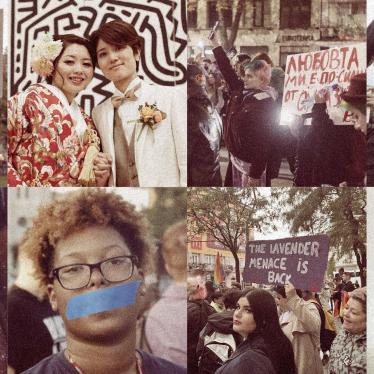Human Rights Watch and the Center for Women’s Global Leadership welcomed a report issued by United Nations today that classifies abuse against women – whether it happens in the home or elsewhere – as a human rights violation. As such, states are obliged by international human rights standards to hold perpetrators accountable.
The 140-page report, entitled “In-depth study on all forms of violence against women,” which was issued by Secretary-General Kofi Annan’s office, confirms that violence against women by spouses, family members and employers is a human rights violation, settling any outstanding debate on this issue. By squarely stating that it is, the report says that governments have an obligation to protect women whether the perpetrators are state or non-state actors.
“This report acknowledges for the first time from the highest levels of the United Nations what human and women’s rights advocates have documented over the past few decades: violence against women is a massive human rights violation that is both a cause and a consequence of deeply ingrained inequality between men and women,” said Charlotte Bunch, executive director of the Center for Women’s Global Leadership at Rutgers University, and a member of the secretary-general’s International Advisory Committee for the study.
The report describes promising practices in the fight against violence against women, but dismisses state efforts so far as mostly ineffective. Even with a sophisticated analysis of the problem and, in certain cases, strong laws related to this violence, most national-level responses have been inadequate, and have not eradicated the impunity perpetrators too often enjoy.
“The secretary-general’s study conveys a very simple message,” said LaShawn R. Jefferson, executive director of Human Rights Watch’s Women’s Rights Division. “The individual who carries out any form of violence against women has committed a crime. A government that does not develop, fund and implement all necessary laws and programs to prevent and to punish this violence violates international human rights law. Both the individual committing the violence and the government blithely letting it happen must be held responsible.”
The study highlights the need for additional attention to violence suffered by women from marginalized groups (such as indigenous peoples or ethnic minorities). The report also draws attention to the problem of under-documentation of violence and control of women’s bodies and sexuality as an insidious component of gender inequality. In addition, the study addresses violence in conflict situations, pertinent issues related to criminal justice systems, service provision for survivors, the need to work with men to address violence, and needs of women who are facing multiple forms of discrimination.
It is incumbent upon the next UN secretary-general to commit to advancing the specific recommendations set out in Kofi Annan’s study, and it is imperative for human rights advocates to keep pressure on governments to fulfill their responsibility, said Human Rights Watch and the Center for Women’s Global Leadership upon the launch of the report.
The report’s recommendations are directed at member states and at various entities within the UN system, and include a call to document and register all forms of violence against women and to provide leadership at all levels in the condemnation and prevention of violence against women.
“What the secretary-general’s study makes clear is that this violence is not inevitable: with sufficient political will, funding, and carefully developed and targeted programs, violence against women can be significantly reduced,” said Bunch. “The issue now is, will governments and the United Nations make a firm commitment to act on the findings of this report?”








